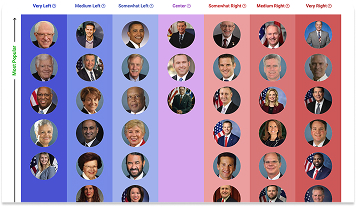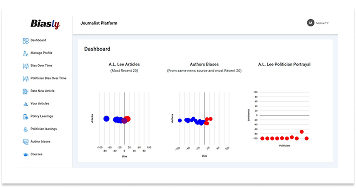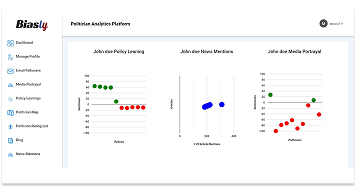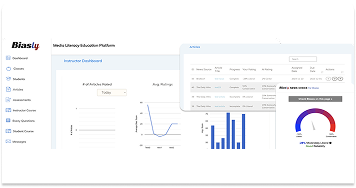-4% Center
Bias Meter
Extremely
Liberal
Very
Liberal
Somewhat Liberal
Center
Somewhat Conservative
Very
Conservative
Extremely
Conservative
-100%
Liberal
100%
Conservative

Biasly determines media bias ratings through a dual-layered approach combining artificial intelligence and analyst review. The platform’s proprietary bias detection engine, Bias Meter, evaluates sentiment, policy position alignment, and language framing across thousands of data points in news articles. Analysts then verify and interpret the AI’s findings, providing additional context where needed. Learn more about ratings
- Profile
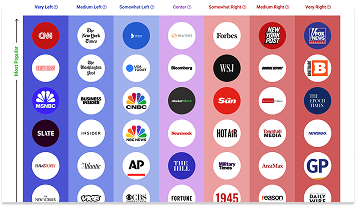
FlaglerLive on the media bias chart
FlaglerLive has a Bias Score of -4% Center which is based on a variety of factors including its policy and politician leanings, article ratings, and the use of biased language. Its Reliability is rated as Average, and additional analytical insights are available in the other tabs.
- Bias Rating
-4% Center
- Reliability60% Reliable AveragePolicy Leanings
2% Center
Extremely
LiberalVery
LiberalModerately
LiberalSomewhat Liberal
Center
Somewhat Conservative
Moderately
ConservativeVery
ConservativeExtremely
Conservative-100%
Liberal100%
Conservative
Average Reliability
*Our bias meter rating uses data science including sentiment analysis, machine learning and our proprietary algorithm for determining biases in news articles. Bias scores are on a scale of -100% to 100% with higher negative scores being more liberal and higher positive scores being more conservative and 0% being neutral. The rating is an independent analysis and is not affiliated nor sponsored by the news source or any other organization.
Politician Portrayal40% negative
Continue For Free
Create your free account to see the in-depth bias analytics and more.
By creating an account, you agree to our Terms and Privacy Policy, and subscribe to email updates.
Log In
Log in to your account to see the in-depth bias analytics and more.
Policy Leanings Analysis
Policy | Bias score |
|---|
FlaglerLive Editorial Patterns
FlaglerLive’s coverage of political topics often reflects a Center bias, with consistent patterns in phrasing, source selection, and thematic focus that is Neutral. While the publication demonstrates journalistic standards in many of its reports, the choice of issues, framing, and word usage can sometimes indicate a political slant. This content analysis examines how FlaglerLive handles liberal and conservative issues and evaluates its language choices and editorial tendencies.
Coverage of Liberal vs. Conservative Topics
FlaglerLive’s articles include progressive social causes, such as religious liberty and more open borders. The articles about these topics tend to adopt sympathetic and supportive language toward them. For instance, its coverage of topics related to clean energy and anti-discrimination laws frequently aligns with liberal viewpoints, using inclusive and affirmative language to frame these policies as necessary.
However, articles covering conservative figures or Republican-led initiatives may sometimes employ a more critical tone. It is not always that this tone is employed, as FlaglerLive publishes articles that favor both points of view. Yet, Biasly’s analysis of recent FlaglerLive articles reveals a slight tendency to highlight controversies or opposition surrounding Republican policies. For example, in political campaign coverage, Republican candidates may receive more scrutiny, with an emphasis on potential missteps or public backlash.
This news media bias manifests in subtle ways, such as placing greater prominence on Democratic voices or omitting pieces of information that may have swayed public opinion toward the right. FlaglerLive has a fair amount of opinion articles alongside its day-to-day coverage, and while these opinion articles may feature ideologies on both sides of our political spectrum, there is still a favorability for those on the left.
Policy and Issue Framing
When covering immigration, FlaglerLive’s articles are often positive, supporting movements for expanded legal protections for undocumented people. This aligns with their Center rating. FlaglerLive’s bias rating aligns with its perspective on immigration. Even as the authors tend to agree with a liberal point of view, there is a commitment to remain rooted in facts. This is important in Florida, especially, as Flagler County is a portion of the greater Miami-Dade that consistently votes blue. Similarly, coverage of civil rights reflects a narrative slightly consistent with left-leaning views, often featuring credible voices from politicians, authors, and citizens who wish to make their opinion known.
Issues like gun rights, stronger border security, or religious liberties are also covered with a relatively left-leaning perspective. However, it still is in accordance with FlaglerLive’s rating as Center, because the primary objective is to report factually, in a more critical tone.
Even in neutral coverage, phrasing choices shape perception. Articles will praise liberal proposals for their apparent positive effects in the country, remarking on how “this is how a Democracy should act”. Conservative articles may praise conservative ideologies, but they are not as common as articles favoring liberals. There is a mixture of the two, but it is this higher output of left-leaning articles that gives FlaglerLive its slightly left-of-center bias. This, even unintentionally, can contribute to bias in news media.
Coverage and Relevance
FlaglerLive’s reporting often touches on key issues central to the media discussion, including local crime, political controversies, and the analysis of biased media narratives. It caters to a large and varied audience on a daily basis, which makes it imperative to analyze the amount of bias present within its articles. FlaglerLive serves as a compelling case study for examining source bias and news media bias in state-focused reporting.
Readers who wish to further explore how FlaglerLive compares with other publications can visit Biasly’s Media Bias Chart to analyze tone and word choice in real time.
FlaglerLive Bias Analysis
FlaglerLive was established in 2008, in Flagler County, Florida. Today, it functions as a local news outlet for the residents of Flagler County, while also informing and opining upon news at the national level. It operates as a nonprofit and shares stories and resources with its audience. FlaglerLive positions itself as a community asset focused on being a place for debate and for local news for those in Flagler County and beyond.
According to Similar Web, FlaglerLive reaches an average of 319,961 users in a month. When it comes to media bias, both AI and media analysts have evaluated its content, sources, and funding to determine its political leaning.
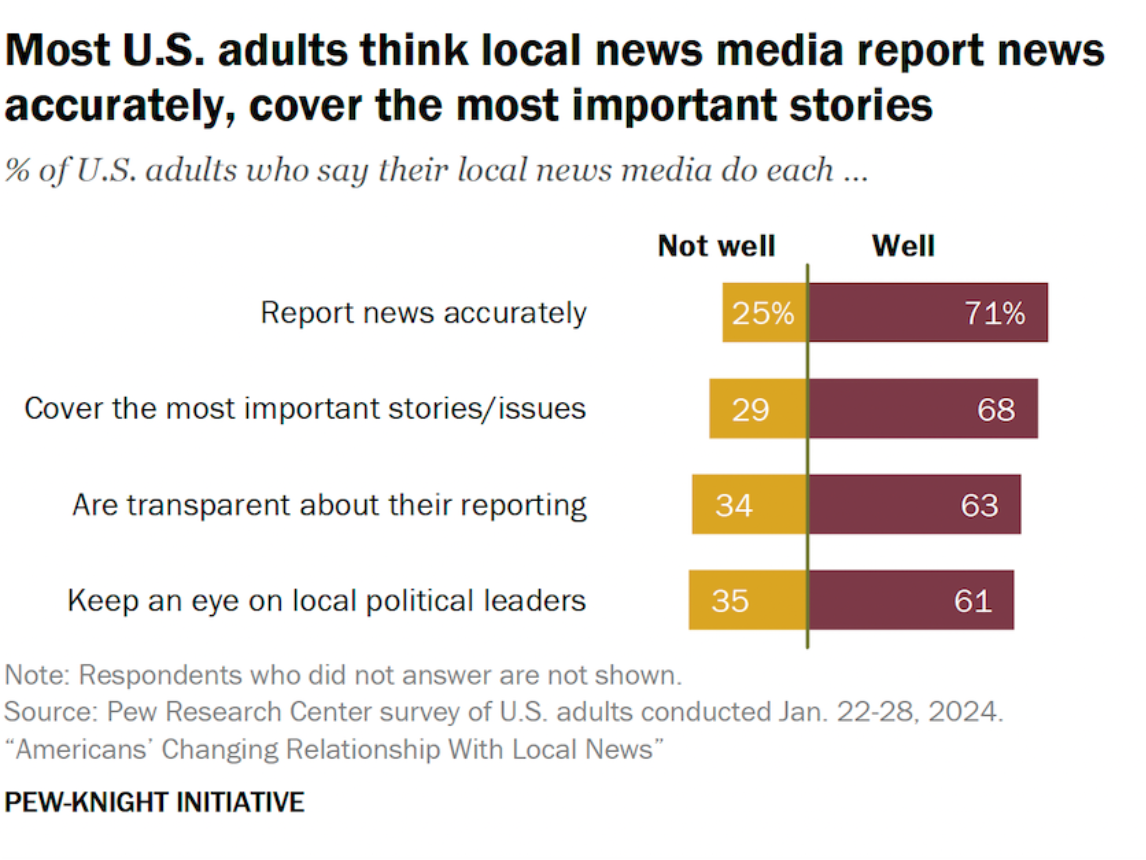
As a local media outlet in Florida, FlaglerLive plays a significant role in shaping public perception. As shown by Pew Research’s chart, adults in the United States consistently rate local news outlets as trustworthy. FlaglerLive is a great example of this, both because of its high volume of readers and the content that it publishes. Readers’ trust in the accuracy of local news may mirror the conclusions reached by Biasly’s media bias ratings. This article delves into FlaglerLive’s editorial tendencies to explore whether political bias is present and, if so, to what degree.
Is FlaglerLive Biased?
Based on Biasly’s evaluations, FlaglerLive is rated as Center.
By examining content patterns and the broader context of media influence, we aim to offer a balanced perspective on FlaglerLive’s political bias—and contribute to the ongoing discussion about bias in the news.
How Does Biasly Rate News Sources?
Biasly uses proprietary algorithms and a team of analysts to provide comprehensive bias evaluations across thousands of news outlets. Over 200,000 articles from more than 3,200 sources have been analyzed to identify the most accurate and unbiased stories.
Biasly assigns each outlet three key scores:
- Reliability Score – Reflects factual accuracy
- AI Bias Score – Generated via natural language processing
- Analyst Bias Score – Assessed by human political analysts
These scores are based on seven core metrics: Tone, Tendency, Diction, Author Check, Selection/Omission, Expediency Bias, and Accuracy. These elements help analysts and algorithms evaluate the political attitude conveyed by each article.
Biasly’s Bias Meter ranges from -100% (most left) to +100% (most right), with 0% indicating neutrality. The system evaluates individual articles based on political terms, policies, figures, and sentiment to calculate precise bias ratings.
Is FlaglerLive Politically Biased?
FlaglerLive earns a Center rating for its AI Bias Score and a Center for its Analyst Bias Score. The Analyst Bias Score is generated by reviewers from liberal, moderate, and conservative backgrounds. Analysts reviewed FlaglerLive articles and noted slight preferences in areas like coverage of liberal politicians and policy topics such as civil rights and healthcare. However, the paper maintains objectivity when not writing opinionated articles, as in those, the facts are stated, and it is left up to the audience to make up their own minds.
For example, coverage of court cases and local occurrences reflects a mostly neutral tone, but articles involving immigration contributed to a liberal lean.
Florida’s demographics present a contrasting backdrop. Florida as a whole leans more right than it does left. It has consistently voted republican in the past three presidential elections, according to 270ToWin. However, FlaglerLive tends to lean a little bit toward the left in its writing and ideology, which does not entirely align with Florida’s political climate.
This means Florida leans more conservative, which could explain differing perceptions of FlaglerLive’s content. The paper may draw mixed reactions depending on readers’ political orientations.
This Bias score is determined through natural language processing that evaluates the tone, word choice, and opinion embedded in the reporting. Recent AI evaluations highlight liberal-leaning narratives in articles discussing the Republican Party and healthcare issues.
Analysis of Bias in FlaglerLive Online Articles
FlaglerLive has found that a mix of coverage of local news within Flagler County and the greater United States is one of the most effective ways to drive subscriptions. Given that much of its readership is Florida-based, where the political climate is often tricky to manage, it’s essential to ask: is FlaglerLive truly biased?
To evaluate this, we can analyze select FlaglerLive articles through several of Biasly’s bias rating criteria: Tone, Tendency, Author, Diction, and Expediency Bias.
- Tone: The overall attitude conveyed by the article
- Diction: Specific word choices made by the writer
- Author: The background and social presence of the journalist
- Tendency: Patterns of bias in the writer’s broader body of work
- Expediency Bias: Quick visual or textual indicators like headlines and photos that imply bias

Source: FlaglerLive
One such article features a headline that connects former conservative activist Mr. Charlie Kirk and the audience. More specifically, it addresses the audience in the context of the next generation, Generation Alpha. The cover image for this article features a work of art by Käthe Kollwitz titled Lament, which already sets a negative precedent for the rest of the article. The article begins solemnly, remarking on Mr. Kirk’s assassination and how it has furthered the division in the United States.
Reporter Colleen Conklin outlines her thoughts on Mr. Kirk and how the different perceptions of him before and after his death have fostered even more hatred. For instance, she explains the danger that comes with forgetting to treat each other as humans, and how this may affect the next generation’s mindsets. While this lends weight to the article, it also reveals Conklin’s own biases when it comes to today’s political climate.
“Generations don’t emerge in isolation. They are cultivated, for better or worse, by the soil we tend. If all we offer them is fear and cynicism, then we cannot be surprised when violence is the only crop. But if we choose to plant something different–compassion stronger than ideology, courage rooted in empathy, the ability to separate people from their ideas–what then grows could astonish us.”
The article leans slightly left in the way that Conklin expresses her desire for more unity, reflecting social justice values. By linking Mr. Kirk’s and other semi-recent political assassinations to the growing polarization in the United States, the author aligns the narrative with left-leaning ideals, emphasizing moral leadership and advocacy. Phrases such as “Humanity is stripped away, leaving only categories” and “to stand against destructive ideas without discarding the human being who holds them” further underscore this left-leaning perspective of moral leadership. This framing, while uplifting, subtly situates the subjects within a progressive ideological lens, further underscoring the article’s ideological view.
On the other hand, another article titled “Jane Goodall Redefined What It Meant to Be Human” is far more balanced. It gives an overview of Jane Goodall’s life through the eyes of one of her prior mentees. The article shares facts about both Goodall and the mentee/author, Mireya Mayor. Phrases and diction like “gentle disrupter”, “completely open mind,” and “her most remarkable observations” reinforce the Mayor’s positive view of Goodall while still providing the sources to back up her claim. Her life is presented factually, without any editorialization:
“Through the Jane Goodall Institute, which works to engage people around the world in conservation, she launched Roots & Shoots, a global youth program that operates in more than 60 countries. The program teaches children about connections between people, animals and the environment, and ways to engage locally to help all three.”
The article employs diction and language that are quite positive, but still restrained and formal. This contributes to its overall neutral tone. The author also avoids emotionally charged words or loaded phrases often seen in more negatively oriented articles. A very slight liberal bias may sometimes be seen in the way Goodall is described, in words such as “persuasive, powerful” and “not to succumb to people’s criticisms”. Throughout most of her article, Mayor avoids emotional or judgmental language, letting the facts speak for themselves.
To sum it up, FlaglerLive rarely shows inconsistent bias across its reporting. While the Mayor’s coverage on Jane Goodall maintains neutrality through balanced presentation and restrained language, the article on Mr. Kirk’s assassination reveals a somewhat progressive slant. It frames the recent political assassinations through a narrative that aligns with left-leaning values. The reliance on the author’s personal opinion further compromises objectivity. FlaglerLive’s tendency to remain mostly unobjective and publish articles through a left-wing lens indicates an overall Center orientation, as articles may have differing amounts of overall bias.
Analysis of FlaglerLive Opinion Articles
To fully understand political bias in media, it’s important to distinguish between factual reporting and opinion pieces. While reporting aims to present facts and let readers form their own conclusions, opinion articles express personal viewpoints on current issues. Although the previous section examined factual reporting, this section turns to how bias surfaces through FlaglerLive’s selection of opinion content.
One prominent example is the article titled “GOP Megabill’s Diagnosis: Higher Health Costs for All, 12 Million Will Lose Coverage”. The title itself signals a persuasive tone and a clear alignment with progressive values. It implies dissatisfaction with the Republican party’s bill that would bring healthcare service cuts, and uses harsh language such as “restrictive approach to immigration” and “enact even higher cost sharing” to make the author’s opinion on it very clear.
In contrast, another piece titled “Teacher Who Certified Student as ‘Most Likely to Become Dictator’ Battles Pending Firing” employs more centrist language. Its title does not lean toward any political side and presents the issue entirely factually. The subheading is neutral and avoids emotionally loaded phrasing, indicating that the piece may be less ideologically charged.
These examples show that a few of FlaglerLive’s pieces carry bias, and the platform frequently publishes content that aligns with Biasly’s bias rating of Center. However, this selection of opinion pieces can contribute to perceptions of systemic bias, particularly when the editorials predominantly support one side over the other.
This underscores the importance of distinguishing subjective viewpoints from straight reporting, especially when interpreting the political leanings of any news organization.
How to Evaluate Bias
Although Biasly rates FlaglerLive as Center, it’s important to remember that bias can vary from article to article. FlaglerLive covers a conservative-leaning state with objectivity on many issues, from state legislation to social developments. This complexity underscores the importance of examining each article individually. So, let’s learn how to evaluate media bias.
Recognizing media bias requires awareness and critical thinking. Often, readers trust news sources that affirm their existing beliefs—a psychological tendency known as confirmation bias. This makes it harder to identify slanted narratives or one-sided reporting.
To combat this, it’s essential to challenge your assumptions by consulting multiple viewpoints and verifying news through third-party analysis. Tools like Biasly’s media bias ratings allow readers to compare the same news story across the political spectrum.
Ultimately, bias isn’t always a matter of what is said—it’s also about what is left out, how topics are framed, and which stories are chosen for coverage. Learning to recognize these patterns can help readers make more informed decisions and develop greater media literacy.
To start comparing news outlets and gain a better understanding of bias, sign up for Biasly’s Media Bias & News Analytics Platform to see how stories vary between sources.
FlaglerLive Reliability Analysis
Is FlaglerLive Reliable?
FlaglerLive finds itself toward the middle of the spectrum, with a rating of “Average” reliability. Its status as a local news outlet contributes to its moderate reputation for reliability. According to Pew Research, Americans generally hold less politically polarized views toward local news compared to national media. In fact, 85% of adults regard local journalism as at least somewhat important to their community.
This suggests that FlaglerLive’s popularity among Flagler County residents may not stem from the reliability of its political news coverage. Further investigation is needed to determine whether bias or other factors are affecting its accuracy. At Biasly, we specialize in evaluating not just bias but also the reliability of media outlets. Let’s explore the accuracy and trustworthiness of FlaglerLive.
How to Evaluate Reliability?
Reliability refers to how trustworthy or accurate a news source is. If we can’t trust what we read, then continuing to consume content from that outlet serves little purpose. So how do we evaluate a news outlet’s reliability?
There are several potential measures of reliability to look out for when trying to determine whether a media source is reliable or not. Red flags for an unreliable article can include the presence of wild, unsubstantiated claims, facts dependent on other unreliable sources, heavy use of opinionated language, and more. In contrast, hallmarks of a reliable source include:
- Absence of subjective language
- Citing credible sources (e.g., .gov, .edu, academic references)
- Verifiable facts and statistics from multiple outlets
- Use of primary sources, like interviews or transcripts
- Consistency with coverage across other platforms
Biasly’s reliability scores incorporate these elements in evaluating media outlets.
So, How Does FlaglerLive Fare in Its Reliability?
The political reliability index developed by Biasly assesses both accuracy and trustworthiness. FlaglerLive currently holds Average Reliability Score, which is calculated as a weighted average of:
- Fact Analysis Score – Evaluates the accuracy of claims, facts, and evidence.
- Source Analysis Score – Assesses the number, diversity, and credibility of sources and quotes used.
FlaglerLive’s Source Analysis Score is Average at 60% Reliable. This suggests moderate trustworthiness in its sourcing practices. The score is AI-generated and considers quote length, frequency, diversity, and quality.
The Fact Analysis Score is yet to be finalized. This score will further determine how well the Tribune supports its claims, addresses selection and omission bias, and presents verifiable evidence. Until this is available, readers are encouraged to perform their own evaluations using Biasly’s media bias tools.
While FlaglerLive leans toward factual reporting, occasional lapses, such as unbalanced viewpoints or omitting important data, may affect its reliability rating. These nuances emphasize the importance of analyzing individual articles.
FlaglerLive’s Accuracy and Reliability
According to Biasly’s analysis, FlaglerLive maintains Average Reliability Score, but individual articles may vary significantly. Let’s dive into the details.
Political orientation plays a crucial role in how audiences perceive reliability. According to Biasly’s media bias analysis, FlaglerLive has a Center on the bias meter. However, as shown above, there are articles published through FlaglerLive that have an undercurrent of opinion within them. To validate such claims, it’s essential to analyze whether the publication backs its assertions with sufficient evidence and diverse viewpoints.
Two common types of bias that affect factuality include:
- Selection Bias – Highlighting or omitting stories to fit a particular narrative.
- Omission Bias – Leaving out differing perspectives or relevant details to skew perception.
Biasly’s accuracy ratings use a scale from 1% (least accurate) to 100% (most accurate). Factors include the presence of supporting evidence, internal and external reliable sources, and balanced viewpoints.
For instance, Biasly gave Business Insider a Medium Left bias and a Good analyst Reliability Score. One Business Insider article, titled “Trump administration signals more mass firings of federal workers if government shuts down”, showed a Good reliability rating for including multiple sources and for using multiple quotes. The language remains fairly unbiased, resulting in the rest of the article maintaining an even tone. Donald Trump’s presidency is currently a very divisive topic, but author Bryan Metzger presents the facts without his own opinion. In contrast, another piece from the outlet, titled “Big Tech and finance companies are telling H-1B employees to get to the US in under 24 hours,” featuring legal and political sources, was rated as Somewhat Left and scored Average for accuracy. While the article centers around reporting and explaining what has happened with the H-1B visas, there is some language used that gives this article its Somewhat Left bias score. Pranav Dixit wrote:
“The urgency of these advisories highlights the massive disruption Trump’s move could trigger across the US tech sector, which relies heavily on foreign-born engineers, developers, and other skilled workers on H-1B visas.”
We will take a closer look at more examples like this below to provide a further investigation into the reliability of FlaglerLive’s articles. This will include its use of selection bias, omission bias, and the quality of its sources and the facts it uses.
Analysis of Reliability in FlaglerLive’s Online News Articles
FlaglerLive aims to serve Flagler County’s residents with unblemished reporting and as a place to foster respectful debate. Its Board of Directors includes members from varying backgrounds, which can help balanced coverage. However, readers should distinguish between news reporting and opinion pieces to evaluate credibility effectively.
One notable example is the article titled “The Shutdown and the Battle Over Obamacare Subsidies”. Reporter Simon F. Haeder covered the ongoing 2025 government shutdown from the perspective of a health policy expert. The article remains mostly neutral, sticking to quotes and fact-based language. There is brief editorialization in which Haeder’s own opinion bleeds through, but it does not impact the original intent of the article. In agreement with FlaglerLive’s Center rating, this piece illustrates factual neutrality.
Quality of Sources and Facts Used
FlaglerLive often uses credible sources from across the political spectrum. However, some articles skew in how comprehensively they present opposing viewpoints.
Consider the headline: “US Passport Is Best Defense Against ICE False Arrest as Supreme Court Approves Profiling in Mass Detentions”. While well-documented and supported by legal references and quotes from attorneys, the article lacks insight into the opposite perspective’s point of view. This absence creates a perception that everyone is entirely against this procedure, even though there is a large number of people who support it.
Readers find no evidence opposing the claim made in this article. There are many quotes from Supreme Court Justices, attorneys, and lawmakers, but all of them are in agreement that the procedure should not be followed through. Author Ariana Figueroa’s opinion also comes through in certain parts of the article, using phrases such as “aggressive drive to carry out mass deportations” and “violates the U.S. Constitution’s Fourth Amendment” to further push her point.
In contrast, the article “Religious Charter Schools’ Fate May Hinge on Justice Roberts” maintains objectivity. It features multiple perspectives from Supreme Court Justices and other judges without any editorial slant. Both ideologies are presented, and the differing opinions of the judges are explained. The author refrains from making any personal assessments. This allows readers to interpret the differences in thought on their own.
The article gains credibility through its 11 quotes from multiple judges—8 long and 4 medium-length. These extensive quotations strengthen reliability by providing full context and minimizing misrepresentation, offering readers a more authentic and trustworthy account from primary sources.
The article features over eight sources, primarily Supreme Court Justices and general judges. While the perspective is limited only to lawmakers, it includes some internal diversity, as is seen in the contrast between Justice Ketanji Brown Jackson and Justice Brett Kavanaugh’s differing stances on the court case.
- James Campbell, Representative of the Oklahoma Charter School Board
- John Roberts, Supreme Court Justice
- Elena Kagan, Associate Supreme Court Justice
- Ketanji Brown Jackson, Supreme Court Justice
- Gregory Garre, Drummond Representative
- Samuel Alito, Associate Supreme Court Justice
- Neil Gorsuch, Associate Supreme Court Justice
The article accurately reflects legislative records and court cases. Controversial statements, such as Justice Jackson’s claim about “St Isidore being denied a benefit no one else gets,” are presented as-is, leaving room for reader interpretation. The article primarily relies on primary sources, which are highly valid and enhance its reliability. Given its focus on the Supreme Court case of St. Isidore of Seville, including perspectives and quotes from many judges, it adds to its reliability.
Selection and Omission Bias
FlaglerLive provides extensive coverage of Flagler County’s politics in addition to the rest of the United States. However, bias may still emerge through framing and story selection.
In “Rampant Gaslighting About Freedom of Speech at Florida Universities”, selection bias surfaces through the article’s emphasis on negative aspects of Republican discourse. The article does not explore positive initiatives led by Florida’s GOP, nor does it present contrasting viewpoints. It is rooted in Author Diane Roberts’ opinion as a Professor at Florida State University, which overrides the amount of facts and quotes that she uses.
The article does not highlight any proactive or positive measures taken by GOP leaders in Florida. It focuses entirely on speaking negatively about Ron DeSantis and his comments toward Florida universities. Therefore, the article leans left in its framing. The author addresses the freedom of speech problem as caused directly by the Republican Party, without exploring broader or contrasting perspectives.
By comparison, the article “UF Rescinds Emeritus Status for Professor Over Kirk Facebook Post” shows a stronger balance. Reporter Jay Waagmeester includes now-deleted X posts from the Professor and X posts from the University that rescinded the status. A notable example of left-leaning bias comes from a source quote:
“This avalanche of hate came after someone reposted my original post on X. This leads me to ask if X has gone over, even more than Facebook, to Trumpers?”
Waagmeester uses several sources that display diversity of opinion when brought together. The article wrote down the Professor’s posts that are now deleted on X, and compared them to posts from conservative activists calling for his removal. Overall, Waagmeester used a well-rounded approach to delivering unbiased news to readers of FlaglerLive.
In opinion pieces, issues with factuality, sources, selection, and omission are frequently present. The articles we’ve covered so far reflect FlaglerLive’s Center views, but this is not detrimental to its reliability. Its story selection may lean slightly to the left, in accordance with the bias rating given by Biasly. However, the contents of FlaglerLive’s article maintain accuracy and tend to cite evidence from numerous and varied sources.
So, Is FlaglerLive Reliable?
Overall, FlaglerLive can be considered to be an outlet that is moderately reliable. It demonstrates a consistent goal of journalistic integrity and typically supports claims with sources and quotes. Occasional omissions and framing bias do appear, particularly on culturally sensitive or partisan issues.
As media literacy improves, readers can more easily detect issues with selection bias, omission bias, and factuality. To strengthen your ability to assess reliability across the political spectrum, use the News Bias Checker to compare how multiple outlets report the same story.
This empowers you to consume more accurate, balanced, and dependable news.
Funding and Ownership
Who Owns FlaglerLive?
FlaglerLive operates under a nonprofit business model, overseen by a board of 5 directors. The Board Directors hail from varied backgrounds, as some are not Florida natives, and others have held jobs in Florida for their whole lives. The main point of contact is Pierre Tristam, who serves as the Editor in Chief.
Under its nonprofit structure, the newspaper’s Board of Directors operates independently of its journalists and does not restrict what the journalists are permitted to write or not. Under FlaglerLive’s Board of Directors page, it states:
“The Board of Directors, listed below, does not control or direct editorial content on FlaglerLive.”
This reinforces the paper’s commitment to transparency in journalism, helping ensure that the Board’s own opinions and financial compensation do not impact its content. While some biases may still arise due to editorial practices, they are not easily attributed to external funding.
This nonprofit approach may provide added reassurance to readers seeking a news outlet that values independence and editorial integrity.
Who Funds FlaglerLive?
FlaglerLive operates as a nonprofit news organization serving Flagler County, Florida. As a nonprofit outlet, its funding model differs from traditional for-profit media companies that rely primarily on shareholders or corporate parent entities.
Based on publicly available information, FlaglerLive’s revenue structure typically includes:
- Individual reader donations and memberships
- Limited advertising and local sponsorships
- Community support initiatives
Potential grants or nonprofit-related contributions
Because it does not operate under a major media conglomerate or publicly traded parent company, FlaglerLive does not appear to have institutional investors or corporate ownership influencing its editorial operations.
The publication states that its Board of Directors does not control or direct editorial content. While nonprofit status can reduce commercial pressures commonly seen in ad-driven media models, nonprofit outlets may still reflect the editorial perspectives of leadership, staff, or the communities they serve.
Additional Insights
News Source Comparison
When it comes to news source comparison, FlaglerLive is often evaluated alongside other regional and national outlets that lean center or center-left. Sources like Reuters, Newsweek, or NBC News often present similar tones and editorial philosophies. While FlaglerLive maintains a Center media bias, it differs from strongly partisan sources in that it occasionally includes opposing viewpoints and strives for regional coverage balance.
This puts it in contrast with more biased media outlets that present consistently one-sided narratives without factual counterpoints. Readers seeking balanced political coverage may compare FlaglerLive’s framing of issues with outlets rated as Center or Lean Right on our Media Bias Chart, or explore other regional papers on our Similar Sources page.
Notable Contributors and Authors
FlaglerLive features a diverse range of reporters and columnists, many of whom frequently stay up to date with issues in Flagler County and in the United States. Reporters like Colleen Conklin, who frequently covers political controversies, exemplify the outlet’s strength in local investigative journalism. Another constant reporter is Pierre Tristam, who often writes about political controversies or current issues within the political climate.
Other contributors focus on immigration, civil rights, and healthcare—topics central to the political discussion in Florida. While some contributors may be seen as leaning left in tone or topic selection, their work is generally grounded in factual reporting. The presence of recurring bylines helps readers evaluate individual journalists’ bias over time.
Related Tools and Resource Pages
To better understand how FlaglerLive fits into the broader media landscape, we recommend exploring these helpful resources:
- Media Bias Chart: See where FlaglerLive ranks among hundreds of media outlets across the political spectrum.
- Political Bias Chart: Visualize political slants of news sources across various policy areas.
- Journalist Bias Analytics Platform: Explore how individual journalists contribute to bias within their publications.
- Politician Bias Analytics Platform: Compare how politicians are framed differently by FlaglerLive and other outlets.
- Media Literacy Education Platform: Learn how to critically assess media sources, bias techniques, and news reliability.
Frequently Asked Questions
FlaglerLive is rated as Center based on Biasly’s media bias algorithm, which assesses sentiment, article framing, and policy favorability.
Biasly uses a combination of AI sentiment analysis and human analyst review to assess tone, fact accuracy, source quality, and media bias indicators. Learn more on our Bias Meter page.
Yes, but with caution. FlaglerLive typically upholds fact-based journalism, though occasional partisan framing and selective reporting may impact overall news reliability.
FlaglerLive is not widely known for promoting fake news, though some articles have shown light selection and omission bias. Its factual reporting is generally sound.
Ratings are based on recent news using data science and A.I. technology.
Military Spending
| Date | Sentiment | Associated Article | Snippet |
|---|---|---|---|
| 08/25/2019 | 75% For | Trump Family Detentions Flores Agreement (link) | So, of course, the Trump administration is doing the opposite in a baldfaced |




























